Custom vs. Template Websites: Which is Right for You?
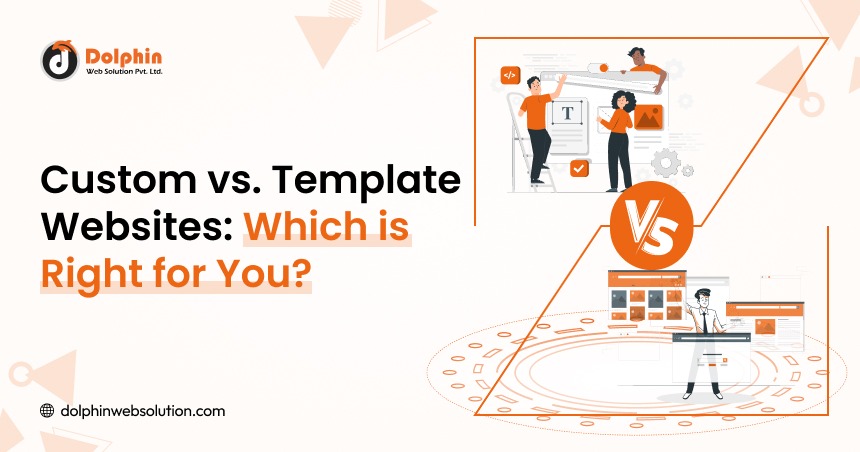
Table of Contents
Summary :
Custom and template websites are the best options for businesses. Custom websites allow businesses complete control, customization, and scale, while template websites are a quick solution. This blog will help you determine the best option for your business and key factors to consider.
Are you planning to build a website for your brand but confused about whether to choose a custom or template design? Well, you are not alone!
It can confuse businesses in determining which approach is best for their brand’s website development. But not anymore!
This blog will explore the pros and cons of custom and template-based design websites and which is better for your business. This will help you choose the right approach and build a website that distinguishes your brand from others.
What is a Custom Website?
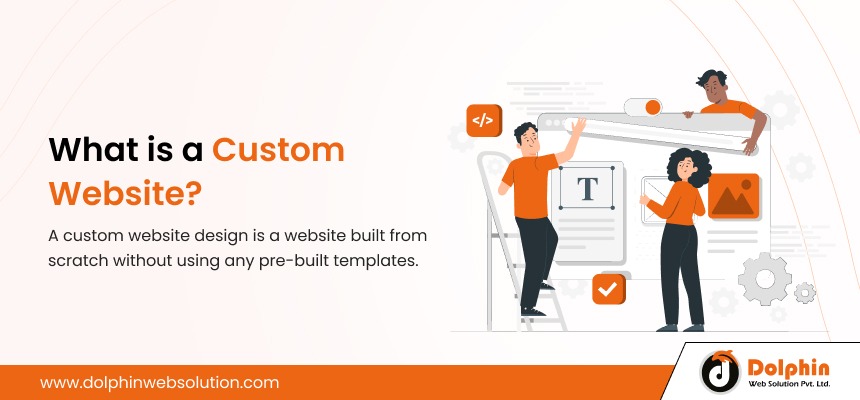
A custom website design is a website built from scratch without using any pre-built templates. Many businesses prefer building sites from scratch to fit their brand appearance and theme. Plus, they can add unique features and other integrations with their existing systems.
While building template-based websites has too many dependencies and subscription fees, building a website from scratch allows brands to customize it according to their business needs.
However, this freedom costs more than pre-built templates because businesses need to create every element.
Many businesses lack the technical expertise to build a website from scratch. So, they prefer to hire experienced website development companies and let the professionals make a website for their brand within budget and time.
Pros of Custom Websites
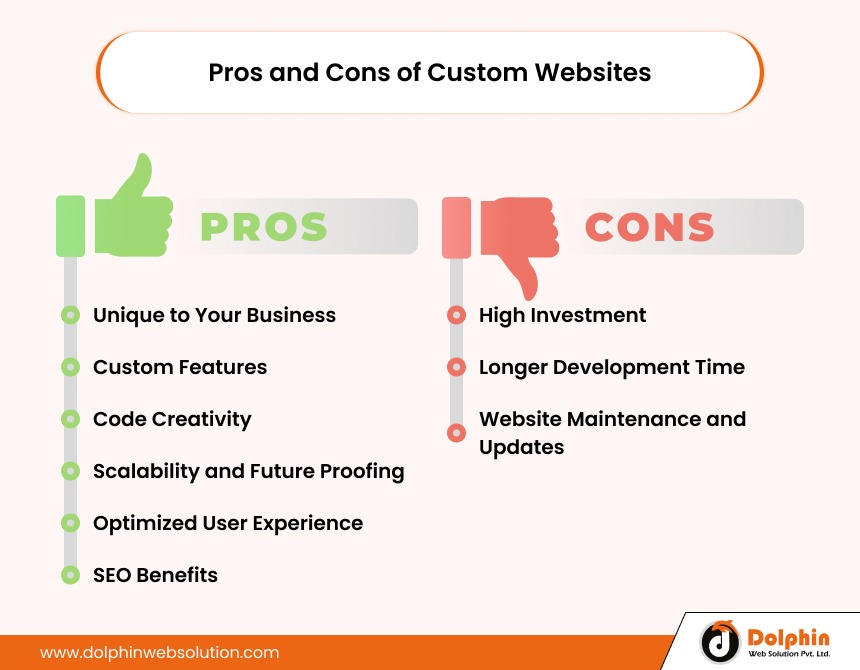
- Unique to Your Business: A custom website is like a tailored suit for your brand. It will be created from scratch, especially for your business’s unique style and theme. This ensures that your website and brand seamlessly complement your business identity.
- Custom Features: You can add only the required functionalities and integrate unique elements into your website that are not offered on template-based websites.
- Code Creativity: Custom websites have cleaner code, resulting in fast loading times and the ability to do high-end customization without registrations.
- Scalability and Future Proofing: Custom websites allow businesses to maintain space for growth, scalability, and future-proofing. Your website can quickly meet the growing demand whenever required.
- Optimized User Experience: Businesses can provide their customers with a more optimized user experience with smooth navigation and functionality, resulting in higher engagement and conversions.
- SEO Benefits: Custom websites allow businesses to implement SEO strategies more precisely, such as tailored URLs, meta tags, and content structures for high ranking.
Cons of Custom Websites
- High Investment: Building a custom website is more expensive than a template-based one due to personalized design and customization.
- Longer Development Time: A custom website takes longer to build because it is designed from scratch, unlike a template-based website, whose structure is already created.
- Website Maintenance and Updates: Custom websites need regular maintenance to stay secure and up to date. This can mean more effort and cost over time, but it keeps your site performing at its best.
What is a Template Website?
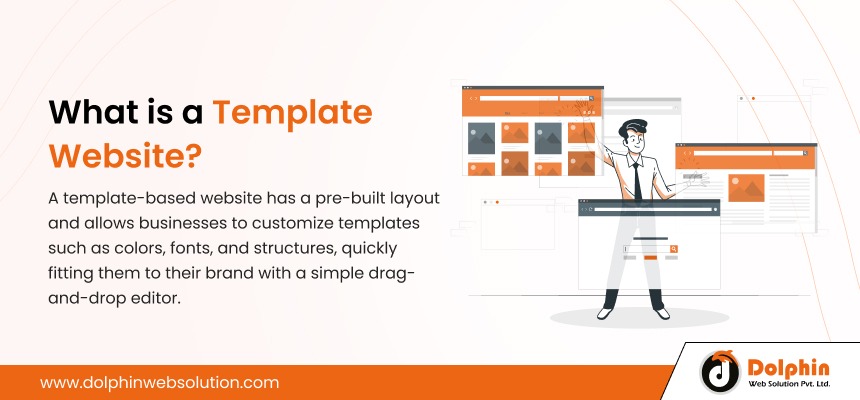
A template-based website has a pre-built layout and allows businesses to customize templates such as colors, fonts, and structures, quickly fitting them to their brand with a simple drag-and-drop editor.
WordPress, Wix, Webflow, GoDaddy, and Squarespace offer pre-built templates for major industries.
Businesses must pick a suitable template for their niche, customize it with built-in editing tools, and quickly prepare it.
However, templates have limited design flexibility compared to custom websites, and businesses must register various items during customization.
It is suitable for businesses looking for easy-to-setup instant websites to launch.
Pros of Template Websites
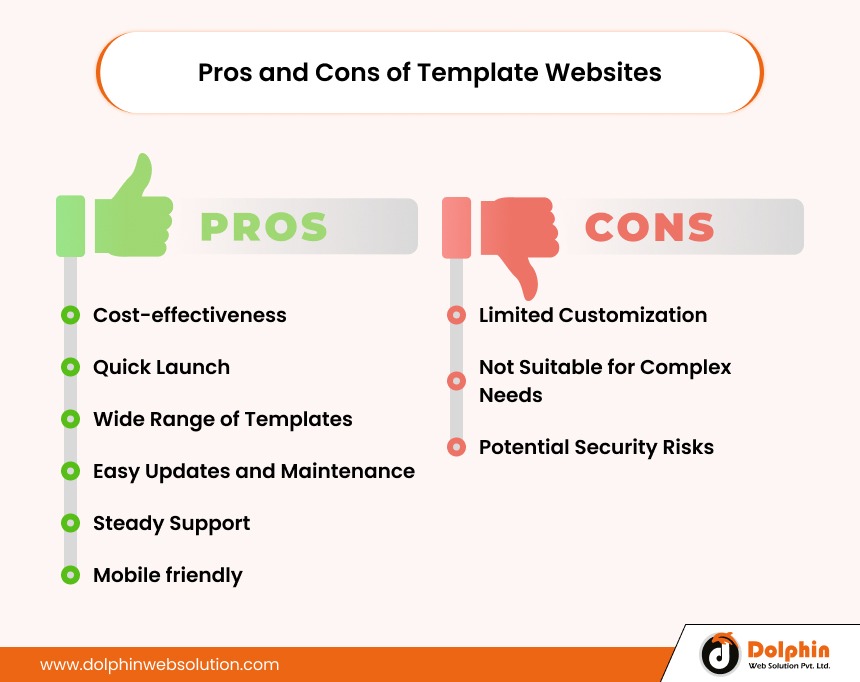
- Cost-effectiveness: Pre-built templates are more cost-friendly than custom designs. Thousands of free or paid pre-built templates are available across all industries. These templates can be easily customized, allowing small businesses to launch their websites quickly and under budget.
- Quick Launch: Templates allow businesses to quickly launch their brands by selecting the theme, customizing it with an easy drag-and-drop editor, and launching with basic changes like fonts, color, and layout to match their style and needs.
- Wide Range of Templates: Many templates are available for different industries and purposes. You can choose from various designs that suit your business’s needs, helping you create a professional-looking website without hiring a designer.
- Easy Updates and Maintenance: These pre-built templates make website maintenance and updates easier. You do not need advanced technical skills to make fundamental changes or updates to your site.
- Steady Support: Many template providers offer constant support to help businesses quickly utilize the template and resolve issues.
- Mobile friendly: Most modern templates come with built-in mobile responsiveness. This means your website will look great on mobile devices, which is essential since mobile traffic now accounts for a significant portion of web visits.
Cons of Template Websites
- Limited Customization: These templates offer the flexibility to launch their websites quickly, but certain customization limitations exist. Small startups with basic website needs can prefer template-based websites. Otherwise, their limited customization would not be suitable for big brands.
- Not Suitable for Complex Needs: Template-based websites are unsuitable for giant companies that want a website with advanced features, a high-end user experience, and seamless integration with existing systems. Adding features or integration requires extensive restoration.
- Potential Security Risks: Some templates, especially free ones, might not receive regular updates, making your site vulnerable to security issues. It is essential to pick a template from a trusted provider to avoid these risks.
Key Factors to Consider When Choosing Between Custom vs Template Website
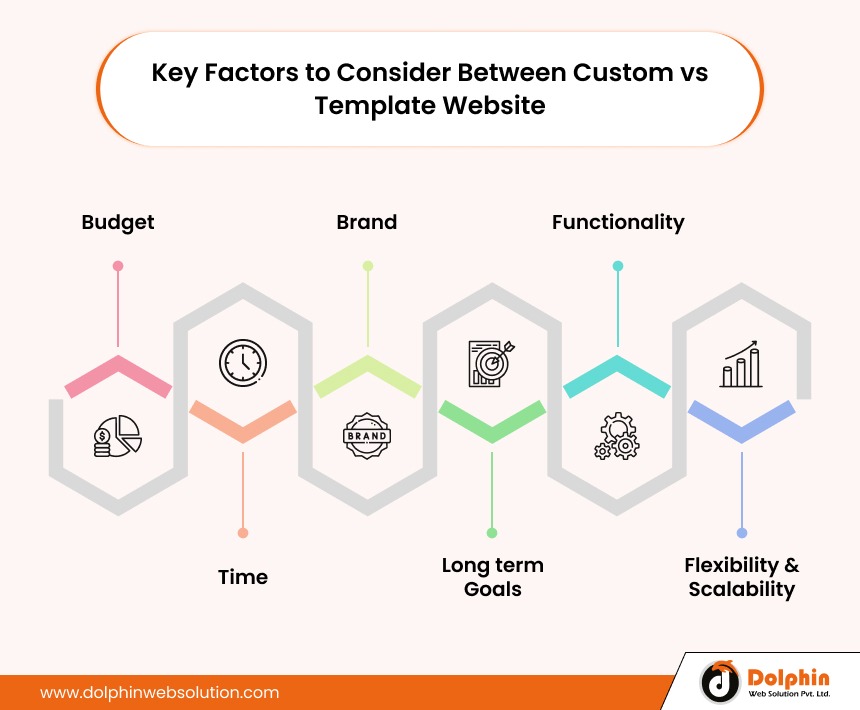
Here are some key factors you can consider when choosing between a custom and template website:
1. Budget
Regarding website development costs, budget is a crucial factor to consider. Because both have different demands for pricing. Custom websites are more expensive than template-based because they require a team of skilled developers and continuous add-ons. On the other hand, template-based website development is a budget-friendly option for those looking for an under-budget website. So, it is all about your budget and the level of website required for your business.
2. Time
How quickly do you want your website ready? A template-based option is much better if you plan to launch your website quickly. However, if time is not an issue and you want to build a high-standard website, custom website development takes time, but it ensures it is worth all the time. This extra time you spend creating your custom website will make it unique and tailored.
3. Brand
Each brand has its uniqueness and identity. So, considering how a website will reflect your brand identity is essential. If you run a giant website offering a wide range of products or services, then a custom website is a solid option for your brand to showcase your brand identity. By building a custom website, a brand can customize everything from color schemes, layouts, and UI/UX to features perfectly tailored for a brand. However, if your business is more physically based and needs an informative digital presence of your brand, then template-based is a suitable option.
4. Long term Goals
While planning a website, you need to consider long-term goals. You can ask yourself: What is your end goal? Do you want to scale in the future? Do you need flexibility? What level of features do you require? These questions will help you evaluate whether you require a high level of customization or are looking for a simple template-based website with minimal functionalities.
5. Functionality
It is time to consider the features and functionalities you want in your website. Custom websites like ecommerce websites allow you to add any features and functionalities to your site without limitation. On the other hand, template-based websites have limitations when adding functionalities. So, a custom site is the way to go if you’re looking for advanced features like custom integrations, complex eCommerce systems, or a highly specialized user experience. But if you need simple features, then template-based can be considerable.
6. Flexibility & Scalability
Lastly, consider the level of flexibility and scalability your website requires. Custom websites are flexible and scalable because they can easily add new features on demand and change design as needed. However, template-based websites have certain limitations in terms of flexibility and scalability. They can meet your current needs but hardly scale as your business grows.
Conclusion
Choosing between custom and template websites completely depends on your business needs, budget, and goals. If you want an advanced-level features website with complete flexibility and scalability, go with a custom website. But if you are looking for a cost-effective, quick-to-launch, and simple website, then template-based websites can fulfill your business needs.
Now, it is your turn to consider these key factors, compare, and find which option suits your business needs and will help you achieve your desired goals. However, it is always recommended to consider an experienced website development company to let the profession guide you in choosing the right option and help you build the website within budget and time.

Hello!
Click one of our contacts below to chat on WhatsApp

